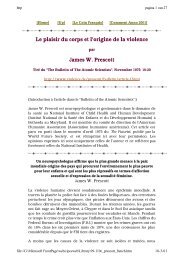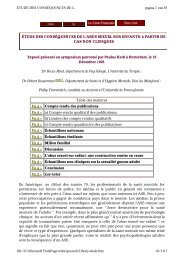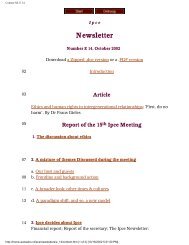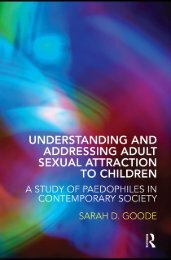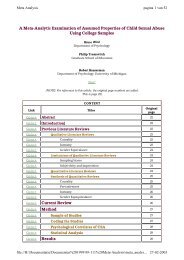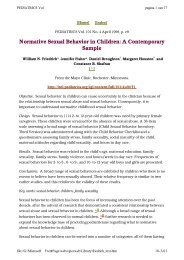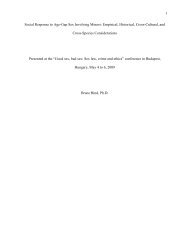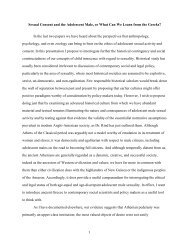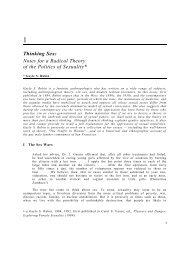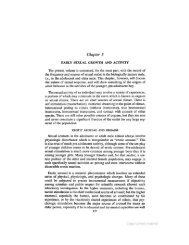Infant and Child Sexuality: A Sociological Perspective - Ipce
Infant and Child Sexuality: A Sociological Perspective - Ipce
Infant and Child Sexuality: A Sociological Perspective - Ipce
Create successful ePaper yourself
Turn your PDF publications into a flip-book with our unique Google optimized e-Paper software.
I don’t believe my folks thought of themselves<br />
as functioning separately from us. If they did,<br />
they did a good job of concealing it.<br />
There was not much sign of mutual attraction<br />
between them, but they just seemed to be existing<br />
together. When I was alone with my father,<br />
at times when he was perturbed, he would sometimes<br />
speak nasty things against my mother. So I<br />
figured they were only together <strong>and</strong> were trying<br />
to make a living together. So as I grew up, I<br />
grew into this pattern.<br />
I think even my parents’ sex expression was subordinated<br />
<strong>and</strong> relegated to a certain time when<br />
it wouldn’t interfere with the family activities.<br />
Even during high school, I can never<br />
recall an instance when I was conscious of the<br />
fact that my parents were having sex relations.<br />
They seemed a little embarrassed when they<br />
kissed in front of us <strong>and</strong> showed little outward<br />
expressions of love. I cannot even remember seeing<br />
them hug. This bothered me while I was growing<br />
up.<br />
The general taboo on child-parent sexual encounters in the United<br />
States makes any specifically sensory-affectional socialization of the<br />
child by parents awkward <strong>and</strong> out of character. This greatly minimizes<br />
the amount of intimacy learning that the child receives directly in the<br />
home. The prohibitions are not always as inclusive as in the following<br />
case, however.<br />
I have no recollection of the word love ever<br />
being used by any member of my family. The outward<br />
display of emotion was never encouraged but<br />
was, in fact, so discouraged that I came to feel<br />
that it was a sign of weakness <strong>and</strong> was wrong. A<br />
kiss was never used as a sign of greeting or<br />
farewell. This control of any outward display of<br />
emotions was so strongly entrenched that I was<br />
reluctant all through high school to become<br />
involved in any situation which might put a<br />
dem<strong>and</strong> on the emotions associated with a relationship<br />
between two people of opposite sex.<br />
Though children in the United States have little opportunity to<br />
learn of the intimate sexual aspects of sensory-affectional relations<br />
from watching their parents, they do pattern their sexual behavior after<br />
their parents based on general observation of parental behavior <strong>and</strong><br />
their own experience of affection or the lack of it in interaction with<br />
their parents. B<strong>and</strong>ura <strong>and</strong> Walters (1963) report that sexually anxious<br />
parents have sons who are both guilty about sex <strong>and</strong> exhibit anxieties<br />
about relating dependently to people. Parents of inhibited boys showed<br />
a constellation of general emotional inhibition, sex anxiety, <strong>and</strong> relatively<br />
infrequent dependency responses directed toward other adults.<br />
The children learn to model their behavior after their inhibited par-<br />
51



